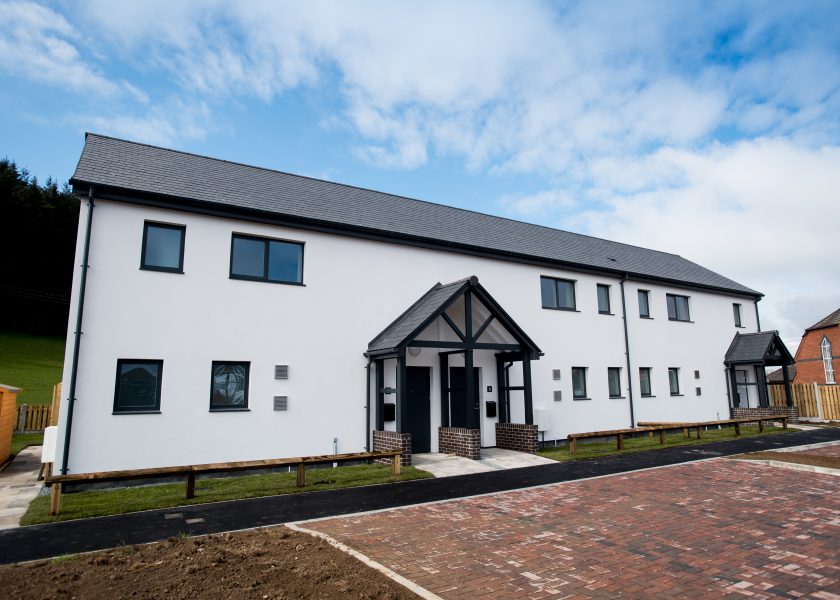Home-grown homes give sarn a smaller carbon footprint
06/07/2021

Contributing to Welsh Government’s 20,000 target of new high quality and energy efficient homes which are affordable to run, a Home-Grown Homes development in Sarn, Powys, uses Welsh timber and has achieved Passivhaus standards.
Designed to test interventions that could positively impact the Welsh timber industry, the Home-Grown Homes project aims to bring low-carbon social housing to Wales. One of these innovative developments can be found in the village of Sarn, where four two-bedroom bungalows, two two-bedroom and one three-bedroom houses have all been Passivhaus certified.
Passivhaus certified for energy efficiency
Passivhaus, or Passive House, was originally developed in Germany in the 1990s. By complying with a set of energy-efficient design criteria, these standards focus on producing low energy buildings that promote healthy living and sustainability.
One of the key principles of Passivhaus design is airtightness, which aims to seal the building and reduce heat loss. Measured by monitoring how often the air pressure changes within one hour, Passivhaus standards allow for a maximum of 0.6 air changes per hour. For this particular development, the final air tests in the bungalows revealed just 0.27 air changes an hour, and 0.49 for the houses.
As well as being extremely energy efficient, these buildings also feature a number of renewable energy technologies. The 4.2 KW solar photovoltaic roof panels generate electricity, while the heat recovery units reuse any excess heat to warm the properties. This means that these homes will remain warm even during the coldest months, significantly reducing the cost of energy bills.
Local timber for a sustainable future
The development project was managed by Powys County Council and followed the principles of the Council’s Welsh Government backed Home-Grown Homes project, an initiative designed to encourage the use of locally grown timber to build low-carbon social housing.
“The Home-Grown Homes project has substantially raised the profile of the timber frame industry in Wales, helping facilitate greater collaboration in the supply chain,” says Darren Jarman from Lowfield Timber Frames, who worked alongside Pave Aways in the construction of these Passivhaus homes in Sarn.
Encouraging the forestry, timber and construction industries to work closely together, this project has been designed to help streamline the entire supply chain. The overall aim of this is to expand the forest sector, finding better ways of using home-grown wood for a sustainable society with a greener future.
A key part of the Home-Grown Homes framework is to minimise embodied carbon. In other words, the aim was to reduce all emissions relating to the construction of the building, such as the supply and transport of raw materials. By sourcing Welsh timber, this project not only supported Wales’ timber industry, but also helped increase the eco-friendly aspect of the overall build.
The local timber was used for a twin wall system, building a double stud wall with a central cavity to reduce heat loss. This was then filled with ample amounts of Warmcel insulation, distributed by Welshpool-based PYC, which is made from recycled newspaper with added mineral salts for fire resistance and protection from fungi and insects.
This is just one of many Passivhaus schemes Lowfield Timber Frames has completed in recent years. Other projects include full-scale housing developments and schools, including the new Welshpool Church in Wales School.
Using local timber and staff, these Passivhaus properties come with a small carbon footprint that has made a big impact on the area’s timber industry. This project is a sign of positive changes taking place within construction, heading towards more sustainable properties.
Source: www.lowfieldtimberframes.co.uk